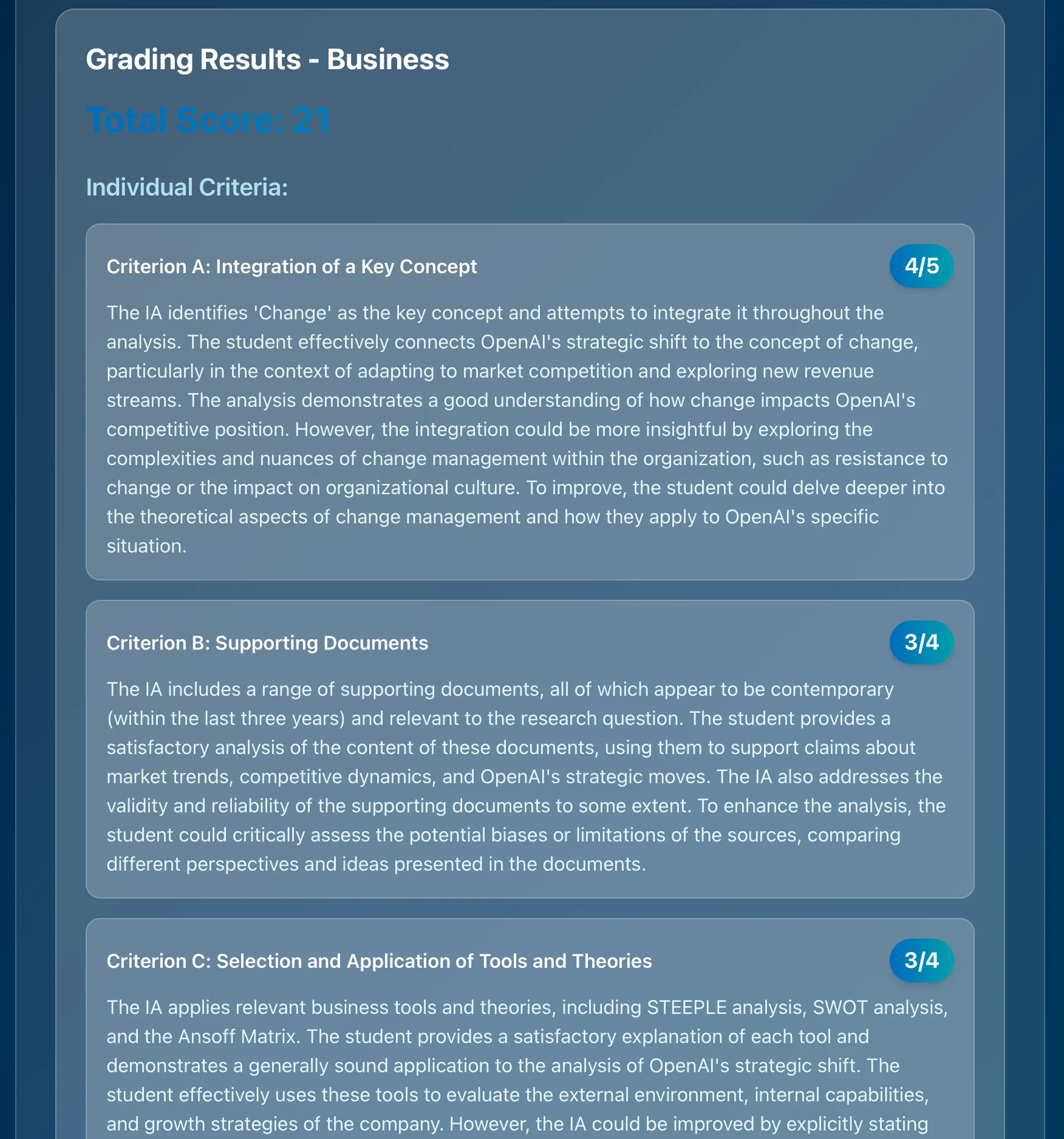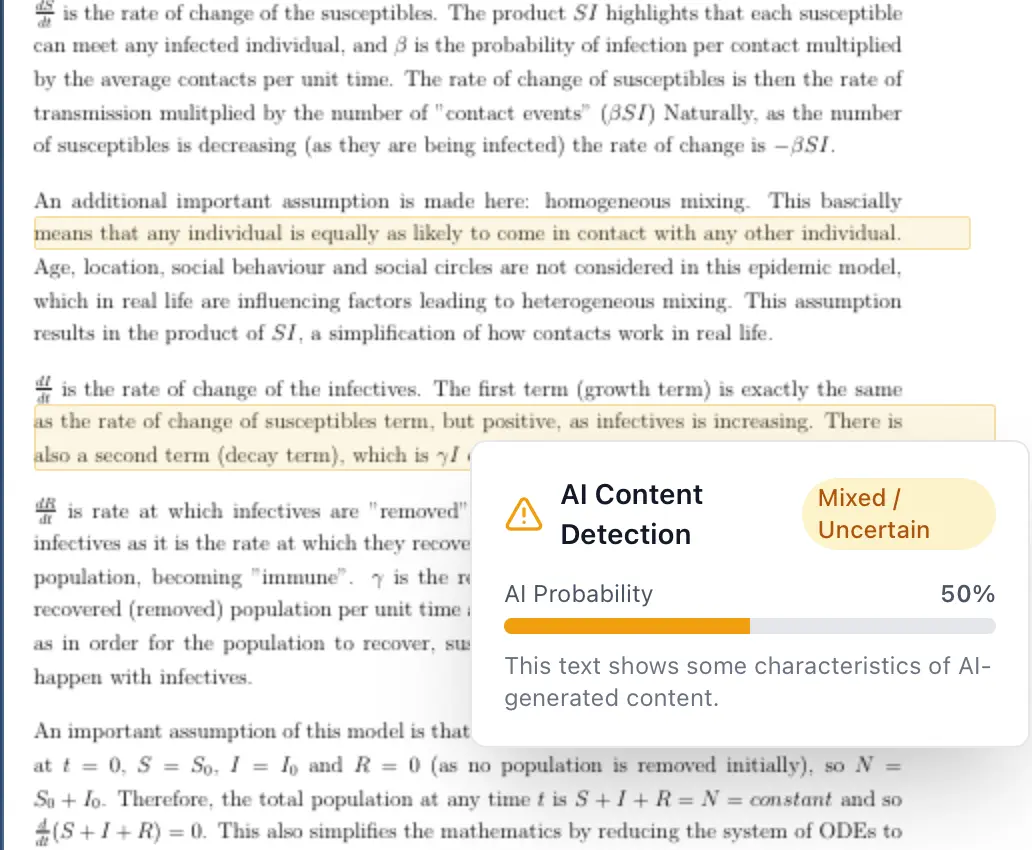How to Structure and Write a Grade 7 IB History IA
Are you aiming for a top score in your IB History Internal Assessment (IA)? This comprehensive guide will walk you through the entire process, from formulating a compelling research question to crafting a well-structured and insightful essay. We'll break down each criterion, offer practical tips, highlight common mistakes to avoid, and even explore how AI can help you achieve a Grade 7. Whether you're just starting or looking to refine your work, this guide provides the tools and knowledge you need to succeed in your IB History IA. Let's get started and unlock your potential for success in your International Baccalaureate History course!
Introduction
The IB History Internal Assessment (IA) is a significant component of your overall IB History grade. It's your opportunity to delve into a historical topic that genuinely interests you, conduct independent research, and demonstrate your analytical skills. Getting a Grade 7 requires a clear understanding of the assessment criteria, meticulous planning, and a well-executed investigation. This guide will provide you with a step-by-step approach to structuring and writing a Grade 7 IB History IA, covering everything from choosing a research question to refining your final draft. We'll explore the specific requirements of each criterion, offer practical advice, and highlight common pitfalls to avoid. By following this guide, you'll be well-equipped to tackle your IA with confidence and achieve your desired score.
Struggling with IB Assessments?
Get instant, detailed feedback on your work with AI that understands IB criteria.

Core Content Sections
1. Choosing a Research Question: The Foundation of Your IA
Your research question is the cornerstone of your entire IA. A well-defined and focused question will guide your research, analysis, and ultimately, your argument.
-
What Makes a Good Research Question?
- Focused: Avoid overly broad questions. Instead of "What were the causes of World War I?", try "To what extent was the assassination of Archduke Franz Ferdinand the primary catalyst for the outbreak of World War I?"
- Researchable: Ensure sufficient sources are available to answer your question. Consider the accessibility of archives, libraries, and online databases.
- Analytical: The question should encourage analysis and evaluation, not just description.
- Interesting: Choose a topic that genuinely interests you. This will make the research process more engaging and rewarding.
-
Examples of Strong Research Questions:
- "To what extent did the economic policies of Deng Xiaoping contribute to China's rise as a global superpower between 1978 and 2000?"
- "How significant was the role of propaganda in shaping public opinion during the Vietnam War?"
- "To what extent was the failure of the League of Nations due to the absence of the United States?"
-
Examples of Weak Research Questions:
- "What was the Cold War?" (Too broad and descriptive)
- "Was Hitler a bad person?" (Subjective and unresearchable)
2. Identifying and Evaluating Sources (Criterion A: 0-6 marks)
Criterion A assesses your ability to select appropriate sources and analyze their value and limitations. This is a crucial step in demonstrating your understanding of historical methodology.
-
Selecting Appropriate Sources:
- Relevance: Choose sources directly related to your research question.
- Variety: Include a mix of primary and secondary sources. Primary sources are firsthand accounts (e.g., letters, diaries, government documents), while secondary sources are interpretations of historical events (e.g., books, articles).
- Reliability: Evaluate the credibility of your sources. Consider the author's expertise, bias, and the publication's reputation.
-
Analyzing Source Value and Limitations:
- Origin: Who created the source? What was their background and perspective?
- Purpose: Why was the source created? What was the author trying to achieve?
- Content: What information does the source provide? What are its strengths and weaknesses?
- Example: "A letter written by a British soldier during World War I provides valuable insight into the daily realities of trench warfare. However, its limitations include the soldier's potential bias towards the British perspective and the possibility of censorship affecting the content."
-
Achieving Top Marks (5-6 marks):
- Your research question must be clear, focused, and appropriate.
- Your sources must be highly relevant and well-chosen.
- You must provide a thorough and insightful analysis of the origin, purpose, and content of your two selected sources.
3. Conducting the Investigation (Criterion B: 0-15 marks)
Criterion B is the most heavily weighted criterion and assesses your ability to conduct a focused and well-organized investigation.
-
Organization and Structure:
- Introduction: Clearly state your research question and provide a brief overview of your argument.
- Body Paragraphs: Each paragraph should focus on a specific aspect of your research question and be supported by evidence from your sources.
- Conclusion: Summarize your findings and answer your research question.
-
Using Sources Effectively:
- Evidence-Based Argumentation: Use your sources to support your claims and build a compelling argument.
- Proper Citation: Cite all your sources using a consistent citation style (e.g., MLA, Chicago).
- Avoiding Plagiarism: Always paraphrase or quote sources accurately and give credit to the original author.
-
Considering Different Perspectives:
- Acknowledge and evaluate different interpretations of historical events.
- Demonstrate critical thinking by analyzing the strengths and weaknesses of various perspectives.
-
Achieving Top Marks (13-15 marks):
- Your investigation must be effectively organized, clear, and coherent.
- You must use a variety of high-quality, reliable sources.
- Your argumentation must remain focused on the stated question throughout the investigation.
- You must demonstrate critical analysis through the evaluation of different perspectives.
4. Reflection (Criterion C: 0-4 marks)
Criterion C assesses your ability to reflect on the challenges and limitations of historical research methods, drawing on your own experience.
-
Reflecting on the Research Process:
- What challenges did you encounter during your research?
- What limitations did your sources have?
- How did your own biases or perspectives influence your interpretation of the evidence?
-
Connecting to Historical Methodology:
- Discuss the broader implications of your findings for historical research.
- Consider how historians grapple with issues of bias, interpretation, and evidence.
-
Example: "During my research, I found it challenging to access primary sources from the perspective of ordinary citizens during the French Revolution. This limitation highlighted the difficulty of reconstructing the experiences of marginalized groups in history and the reliance on official records, which may be biased."
-
Achieving Top Marks (3-4 marks):
- You must deeply reflect on the research methods employed by historians, drawing from your own experience.
- You must demonstrate a clear understanding of the challenges confronting historians.
- You must effectively integrate your reflections into the broader context of the investigation.
Common Challenges/Mistakes Section
- Choosing a Too Broad Research Question: This leads to unfocused research and a superficial analysis.
- Solution: Narrow down your research question to a specific time period, geographic location, or aspect of the topic.
- Relying Too Heavily on Secondary Sources: While secondary sources are valuable, they should not be the sole basis of your investigation.
- Solution: Make a conscious effort to incorporate primary sources into your research.
- Failing to Properly Cite Sources: This can lead to plagiarism, which will result in a failing grade.
- Solution: Use a consistent citation style and carefully track all your sources.
- Descriptive Writing Instead of Analytical Writing: Simply summarizing information from your sources is not enough.
- Solution: Analyze the information, evaluate different perspectives, and develop your own argument.
- Ignoring Counterarguments: Failing to acknowledge and address opposing viewpoints weakens your argument.
- Solution: Actively seek out counterarguments and explain why your perspective is more convincing.
Pro Tip: Get AI-Powered Grading
Stop second-guessing your grades. Get instant feedback aligned with official IB rubrics.

Advanced Tips/Strategies Section
- Develop a Strong Thesis Statement: A clear and concise thesis statement will guide your research and provide a framework for your argument.
- Use a Variety of Evidence: Support your claims with a diverse range of sources, including primary documents, statistical data, and expert opinions.
- Engage with Historiography: Demonstrate your understanding of the existing scholarship on your topic by referencing and engaging with the work of other historians.
- Refine Your Writing: Pay attention to grammar, spelling, and clarity. A well-written IA will be more persuasive and easier to understand.
- Seek Feedback: Ask your teacher or a trusted peer to review your IA and provide constructive criticism.
Technology and Modern Assessment Section
The landscape of IB assessment is evolving, and technology is playing an increasingly important role. AI-powered tools are emerging to help students and teachers alike. For example, Marksy is an AI grading assistant specifically designed for the International Baccalaureate. It provides instant, accurate, and detailed feedback on student work based on official IB rubrics.
-
How AI Helps with IB History IAs:
- Rubric-Aligned Scoring: AI algorithms are trained on the official IB rubrics, ensuring that your IA is assessed according to the correct criteria.
- Detailed Criterion-by-Criterion Feedback: AI can identify areas where you excel and areas where you need improvement, providing specific suggestions for how to enhance your work.
- Consistency and Objectivity: AI eliminates subjective bias, ensuring that all students are assessed fairly and consistently.
-
Benefits for Teachers:
- Time-Saving: AI can automate the grading process, freeing up teachers to focus on providing individualized support to students.
- Improved Accuracy: AI reduces the risk of human error, ensuring that all IAs are assessed accurately.
- Enhanced Feedback: AI provides detailed and actionable feedback that helps students understand exactly how to improve their work.
Marksy helps teachers provide consistent, detailed feedback on IB assessments, saving them valuable time while maintaining assessment quality. These AI tools use official IB criteria to ensure accuracy and fairness, ultimately benefiting both educators and students.
Conclusion with Clear Next Steps
Writing a Grade 7 IB History IA requires careful planning, diligent research, and a commitment to critical thinking. By following the guidelines outlined in this guide, you'll be well-equipped to tackle your IA with confidence and achieve your desired score. Remember to choose a focused research question, select appropriate sources, conduct a thorough investigation, and reflect on the challenges and limitations of historical research.
Here are your next steps:
- Brainstorm potential research questions: Consider topics that genuinely interest you and that align with your strengths.
- Conduct preliminary research: Explore available sources and assess the feasibility of your research question.
- Develop a detailed outline: Plan the structure of your IA and allocate time for each stage of the process.
- Start writing! Don't be afraid to revise and refine your work as you go.
- Get feedback from your teacher or a trusted peer.
- Consider using Marksy to get instant, accurate feedback on your IA draft.
Ready to take your IB History IA to the next level? Try Marksy for free today and see how AI can help you achieve a Grade 7! [Link to Marksy Free Trial]